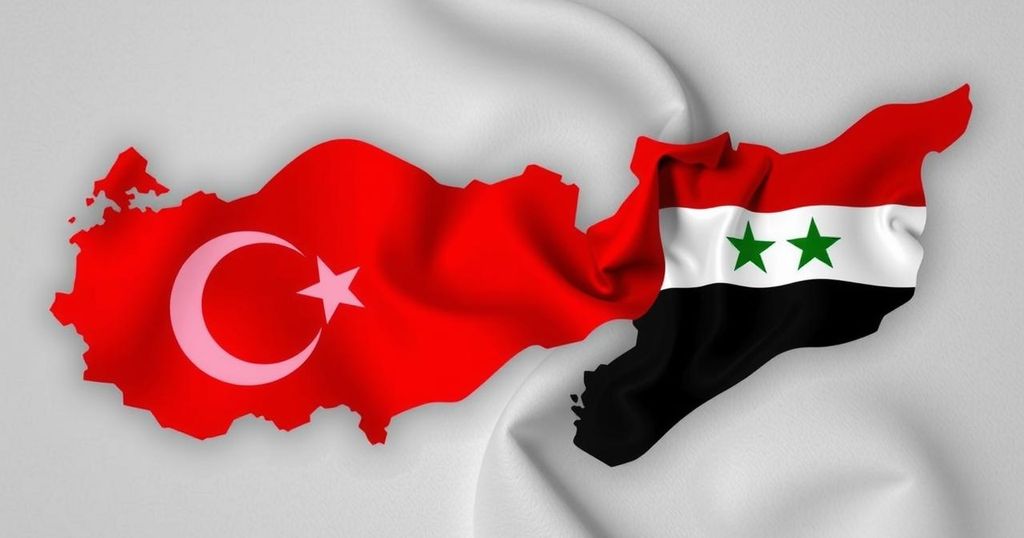Turkey is seeking support from Saudi Arabia and the UAE to stabilize Syria after Bashar al-Assad’s regime collapse. Turkish officials are cautious to avoid past mistakes during the Arab Spring and emphasize the need for regional and Western collaboration. President Erdogan aims to engage Gulf nations for long-term support, while also addressing concerns regarding HTS. The future of Syria’s political landscape remains intertwined with the interests of various international stakeholders, including Russia.
In response to the rapid political shift in Syria following the unexpected downfall of Bashar al-Assad’s regime, Turkey is actively seeking alliances with Saudi Arabia and the United Arab Emirates (UAE) to influence Syria’s future governance. Turkish officials in Ankara aim to avoid past mistakes observed during the Arab Spring, emphasizing the necessity for collaboration with regional allies and Western powers to bring stability to Syria, a country severely impacted after years of conflict.
Turkish President Recep Tayyip Erdogan is notably seeking Gulf support, as he acknowledges the apprehensions held by Saudi Arabia and the UAE regarding movements such as the Muslim Brotherhood. A source familiar with the government’s strategy asserted, “The president believes the concerns raised by Saudi Arabia and particularly the United Arab Emirates should be heard, and their advice valued in Syria.”
Erdogan is anticipated to participate in an upcoming summit in Cairo, where he will dialogue with Egyptian President Abdel Fattah el-Sisi, who shares apprehensions about the growing presence of Hay’at Tahrir al-Sham (HTS) in Syria. While Turkey has historically distanced itself from HTS, a former al-Qaeda affiliate, Turkish Foreign Minister Hakan Fidan has recognized Turkey’s deep understanding of the group, stating, “No one knows this group better than Turkey.”
The discussions extending beyond rhetoric encompass intricate geopolitical dynamics impacting the formation of a new Syrian government. Recent dialogue involving regional and international players, including the United States and European nations, emphasizes the creation of a versatile and inclusive governance model in Syria.
Turkey has articulated its vision for a neutral Syria, with Fidan expressing the desire for a government that does not threaten neighboring countries with terrorism. He asserted, “We do not want Iranian domination in the region, nor do we want Turkish domination.” This sentiment reflects Turkey’s advocacy for mutual respect and cooperation among regional powers, aimed at preventing external influences from exacerbating conflicts within Syria.
Furthermore, Turkish overtures towards the UAE have resonated positively, prompting reassessments from Gulf leaders about their previous stance on Assad’s administration. Notably, the UAE has shown willingness to engage with the HTS-led government, signaling interest in supporting Syria’s recovery.
However, significant challenges remain, primarily the presence of Russia, a staunch ally of Assad. Some European nations insist on Russia’s withdrawal from Syria before committing to any rebuilding initiatives. Concurrently, Moscow is engaged in negotiations with HTS regarding the future of its military commitments in Syria.
Turkey’s efforts rely heavily on garnering financial support for reconstruction from regional and Western powers, as officials seek to stabilize Syria and reintegrate it into the international community.
The article discusses Turkey’s strategic efforts to seek the support of Saudi Arabia and the UAE in light of the recent upheaval in Syria following the fall of Bashar al-Assad’s regime. It highlights Turkey’s cautionary approach to avoid the pitfalls experienced during the Arab Spring and its collaborative intentions with regional and international allies to foster stability within Syria. The piece underscores the geopolitical complexities surrounding the new Syrian governance and the significant influence of both regional organizations and foreign powers in the reconstruction efforts.
Turkey’s pursuit of Saudi and UAE cooperation exemplifies its determination to shape a stable future for Syria after a tumultuous decade of conflict. The endorsement of a neutral and inclusive government reflects Turkey’s commitment to ensuring Syria does not pose threats to its neighbors. Moreover, the inclusion of Gulf nations and Western allies is crucial to mobilizing the necessary financial and political support, while reconciling Turkey’s aspirations with the realities of Russian influence in the region remains a significant challenge.
Original Source: www.middleeasteye.net







